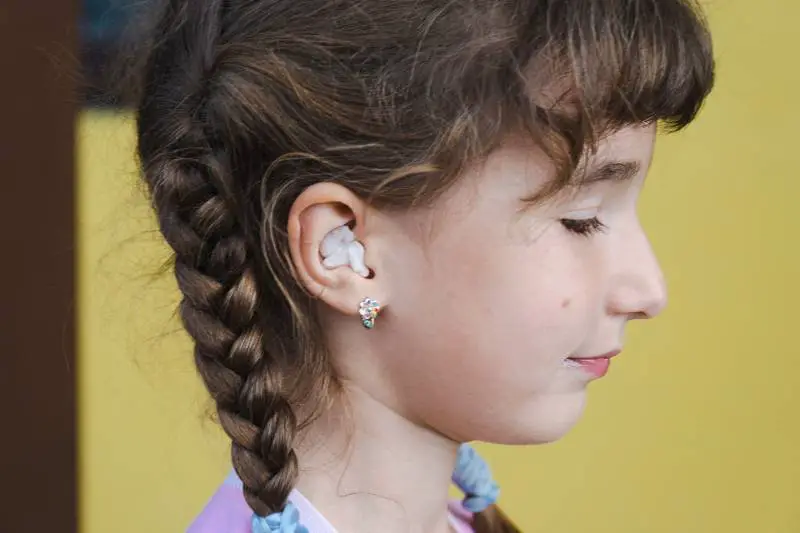Introduction
Welcome to “Congenital Hearing Loss: A Comprehensive Guide to Unlock the Secrets”! This guide will help you understand everything you need to know about congenital hearing loss and how it can impact a child’s development. Congenital hearing loss refers to a hearing loss that is present at birth. It can be caused by a variety of factors such as genetics, infections, or exposure to certain medications during pregnancy.
One of the most important things to understand about congenital hearing loss is the impact it can have on a child’s communication, cognitive, social, and emotional development. This is why it’s vital for caregivers to provide a rich, abundant language environment to children from an early age. This means speaking to them in the language or languages that family members speak fluently. By providing a rich language environment, you can promote social connections within the family and help the child with their development.
However, providing aural rehabilitation in a language other than the family’s native language can be challenging. This is especially true if a child with a hearing implant lives in an area where more than one language is spoken or if the family’s native language is different from the language spoken in their area or by the person who helps with their rehabilitation. In this guide, we will explain how to determine the intervention language for aural rehabilitation, and how to ensure equitable access to intervention and information for families who speak languages other than those shared by the rehabilitation professional.
congenital hearing loss is the impact it can have on a child’s communication, cognitive, social, and emotional development
Symptoms of congenital hearing loss
There are several symptoms of congenital hearing loss that parents and caregivers should be aware of. Some of the most common symptoms include:
Not responding to loud noises or voices: Children with congenital hearing loss may not react to loud noises or voices, even if they’re close by. They may not startle when there’s a loud noise or turn their head when someone is speaking.
Not responding to their name: Children with congenital hearing loss may not respond when someone calls their name, even if they’re in the same room.
Not speaking or delayed speech development: Children with congenital hearing loss may not start speaking at the same time as other children, or they may not speak at all. They may also have difficulty understanding what people are saying to them.
Difficulty following directions: Children with congenital hearing loss may have trouble following directions, even if they can hear them. They may not understand what’s being said to them, or they may not be able to hear the instructions clearly.
Lack of attention: Children with congenital hearing loss may seem unresponsive or inattentive to their surroundings, even if they can hear. They may not be as interested in what’s happening around them, and they may not be as active or engaged as other children.
It’s worth noting that some children with congenital hearing loss may not show any symptoms at all, or their symptoms may be subtle, so it’s important for parents and caregivers to be aware of the potential signs and to seek professional evaluation if they suspect a hearing loss.
Ringing in the Ears? Uncovering the Mystery of Tinnitus
Buzzing in the ears is similar to ringing in the ears. It is a common symptom of tinnitus and refers to a low-pitched sound, like that of an insect, that is heard in one or both ears.
Types of congenital hearing loss
There are two main types of congenital hearing loss: sensorineural and conductive. Sensorineural hearing loss is caused by damage to the inner ear or nerve pathways that carry sound to the brain. It’s the most common type of congenital hearing loss and it can’t be corrected with surgery or medication. It’s usually permanent and can range from mild to severe. Children with sensorineural hearing loss often benefit from hearing aids or cochlear implants.
Conductive hearing loss, on the other hand, is caused by a problem in the outer or middle ear that prevents sound from being conducted to the inner ear. It can be caused by things like a blockage in the ear canal, a malformation of the ear bones, or a fluid buildup in the middle ear. Unlike sensorineural hearing loss, conductive hearing loss is often temporary and can be corrected with surgery or medication.
It’s worth noting that there’s also a third type of congenital hearing loss called mixed hearing loss which is a combination of sensorineural and conductive hearing loss. This type of hearing loss can be caused by a combination of problems in the inner, middle and outer ear. Children with mixed hearing loss may benefit from a combination of treatment options, such as hearing aids and/or surgery.
Causes of congenital hearing loss
There are many different causes of congenital hearing loss, but some of the most common include genetics, infections during pregnancy, and exposure to certain medications during pregnancy.
Genetics is a major cause of congenital hearing loss. Hearing loss can be inherited from one or both parents, and it can be caused by a change in a specific gene. Many different genes can cause congenital hearing loss, and in some cases, the cause is unknown. Some children are born with hearing loss due to a genetic disorder, such as Usher syndrome, which affects both hearing and vision.
Infections during pregnancy can also lead to congenital hearing loss. For example, if a mother contracts rubella (German measles) during pregnancy, it can cause hearing loss in the unborn child. Other infections, such as cytomegalovirus (CMV) and syphilis, can also cause congenital hearing loss.
Exposure to certain medications during pregnancy can also lead to congenital hearing loss. For example, some antibiotics, anti-inflammatory drugs, and chemotherapy drugs can cause hearing loss in the unborn child if taken during pregnancy. It’s important for expectant mothers to talk to their healthcare provider about any medications they’re taking during pregnancy to be sure that they’re safe for the baby.
It’s important to note that in some cases, the cause of congenital hearing loss is unknown and it can be a combination of different factors. Therefore, it’s important for expectant mothers to have regular check-ups and screenings to detect any potential hearing loss in their newborns.
Treatments for congenital hearing loss
Treatment for congenital hearing loss depends on the type and severity of the hearing loss. For conductive hearing loss, surgery or medication may be used to correct the problem. Surgery could include removing an obstruction in the ear canal, repairing a malformation of the ear bones, or placing a tube in the eardrum to drain fluid. Medications may include antibiotics to treat infections or steroids to reduce inflammation.
For sensorineural hearing loss, which is the most common type of congenital hearing loss, treatment typically involves the use of hearing aids or cochlear implants. Hearing aids amplify sound and make it louder, making it easier for the person to hear. Cochlear implants are electronic devices that are surgically implanted into the inner ear. They work by converting sound into electrical signals that are sent to the brain, helping a person to hear.
For mixed hearing loss, a combination of treatments may be used, such as hearing aids, cochlear implants, and surgery. Some children may also benefit from speech therapy or other forms of communication therapy to help them learn to understand and use language.
It’s important to note that early intervention is key when it comes to treating congenital hearing loss. The earlier a child is diagnosed and receives treatment, the better the outcome is likely to be. Regular monitoring and follow-up care is also important to ensure that the treatment is working effectively and to make any necessary adjustments.
QUIZ - CAUSES AND THE LEVELS OF TINNITUS
Symptoms of Hearing Loss: What They Are, And How To Deal With Them
Hearing loss is a sad reality for many people. Whether it’s from an accident or just growing old, hearing loss is something that affects more than we might think.
Need for early intervention
It’s important to recognize the symptoms of congenital hearing loss as early as possible in order to provide the best possible outcome for the child. Early intervention is crucial as it can improve the child’s ability to hear and understand speech, as well as improve their overall development.
When a child is diagnosed with congenital hearing loss early, they can receive treatment such as hearing aids or cochlear implants, which can help them hear and understand speech. Additionally, they can start speech therapy or communication therapy as early as possible, which can help them learn to speak and understand language.
Early intervention can also help to prevent delays in the child’s overall development. Children with congenital hearing loss can have delays in their speech and language development, as well as social and emotional development. By identifying and treating the hearing loss early, these delays can be minimized, and the child can have a better chance of reaching their full potential.
It’s important for parents, caregivers, and healthcare professionals to be aware of the potential signs of congenital hearing loss and to seek professional evaluation if they suspect a hearing loss. Early intervention can make a big difference in the child’s development, so it’s crucial to identify and address congenital hearing loss as soon as possible.
Conclusion
In conclusion, congenital hearing loss is a complex condition that can impact a child’s development in many ways. It’s important for caregivers to understand the different types of congenital hearing loss, causes, symptoms and treatment options available.
First, there are two main types of congenital hearing loss: sensorineural and conductive. Sensorineural hearing loss is caused by damage to the inner ear or nerve pathways that carry sound to the brain, and it’s usually permanent. Conductive hearing loss is caused by a problem in the outer or middle ear that prevents sound from being conducted to the inner ear, and it’s often temporary. Additionally, there’s a third type called mixed hearing loss which is a combination of sensorineural and conductive hearing loss.
The causes of congenital hearing loss can be varied and complex, including genetics, infections during pregnancy, and exposure to certain medications during pregnancy. The treatment options for congenital hearing loss include surgery, medication, hearing aids, cochlear implants and a combination of these options. It’s important for expectant mothers to have regular check-ups and screenings to detect any potential hearing loss in their newborns.
Early intervention is key when it comes to treating congenital hearing loss and regular monitoring and follow-up care is important to ensure that the treatment is working effectively and to make any necessary adjustments. This guide has provided a comprehensive overview of the key aspects of congenital hearing loss and the available treatment options to help you understand this complex condition and make informed decisions.






